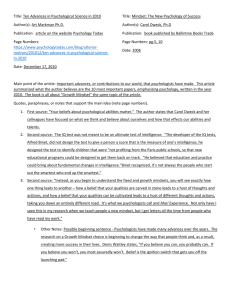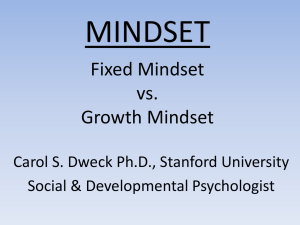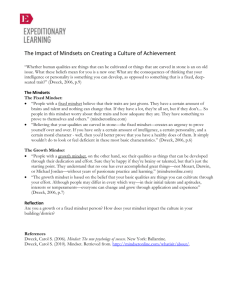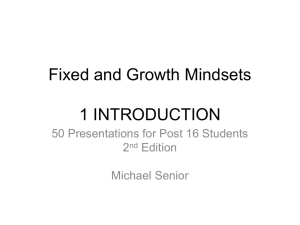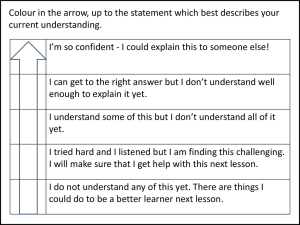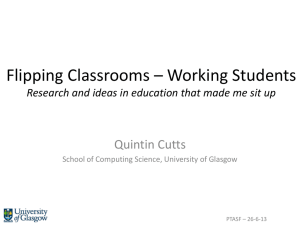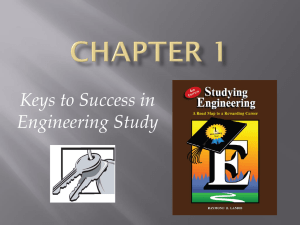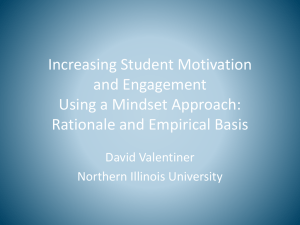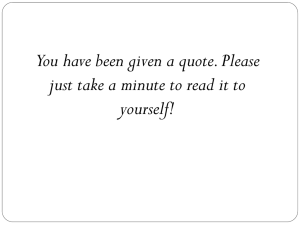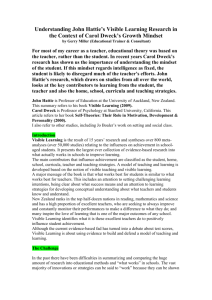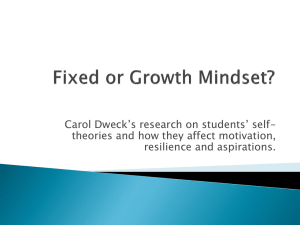Derek Goldman (OU) Health and Wellbeing
advertisement
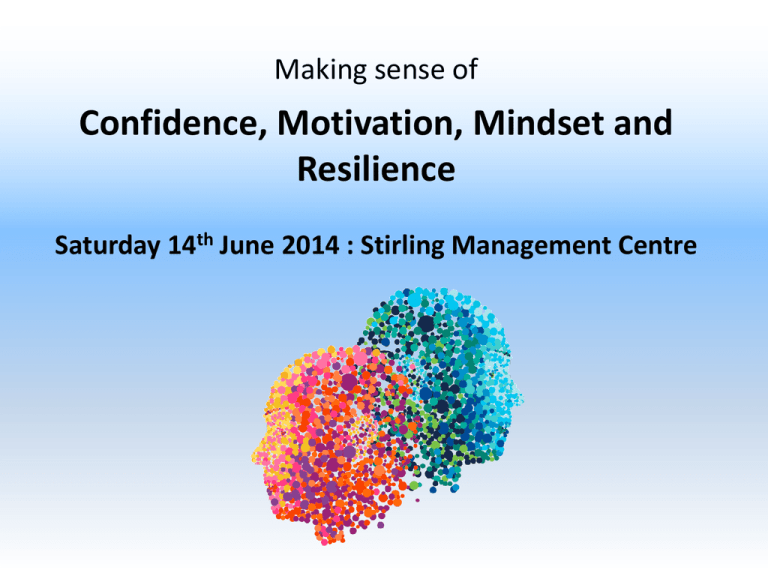
Making sense of Confidence, Motivation, Mindset and Resilience Saturday 14th June 2014 : Stirling Management Centre What we’ll cover today • An exploration of confidence • A closer look at motivation and the growth mindset • Some thoughts/insights into resilience • A broader look at wellbeing in the workplace Confidence • What is confidence? • What does confidence look like? • What are the barriers in developing confidence in ourselves and others? Self-Determination Theory (Deci & Ryan) Relatedness Self-Determination Theory Autonomy Competence Professor Carol Dweck’s self-theories • • • • • Based currently at Stanford University in California Over 30 years research in this area Interested in student perceptions of themselves as learners Self theory linked to self belief, motivation and future aspirations Carol Dweck has been in Scotland several times, including another planned trip in September 2014 Having a look at Mindset Carol Dweck’s research within a historical context • • • 1954: Reuven Feuerstein's work on the teaching of intelligence (see Changing Children’s Minds by Howard Sharron, 1994) 1967: Michael Scriven – difference between Formative and Summative assessments 1988: Terry Crooks demonstrates that there is little evidence that classroom assessment assists in the learning process Having a look at Mindset Carol Dweck’s research within a historical context (contd.) • 1998: Paul Black & Dylan William’s “Inside the Black Box” – potential for assessment to provide feedback to improve learning • 1999: John Hattie’s work on “Influences on student learning” • 2000: Carol Dweck’s “Self Theories : Their Role in Motivation, Personality and Development” • 2006: Carol Dweck’s “Mindset – the new psychology of success” • 2009: John Hattie’s “Visible Learning” The Growth Mindset “For twenty years, my research has shown that the view you adopt for yourself profoundly affects the way you lead your life. It can determine whether you become the person you want to be and whether you accomplish the things you value. How does this happen? How can a simple belief have the power to transform your psychology and, as a result, your life?” Professor Carol Dweck Entity and Incremental Self Theories about Intelligence Self Theories: Entity (fixed mindset) • Belief that my intelligence is fixed • Born with a certain amount – work within your limitations • Don’t want to look stupid – so avoid challenge • Fear of failure or failure avoidance • Set easy performance goals with low challenge Self Theories: Incremental (growth mindset) • • • • • • Belief that my intelligence isn’t fixed “I can develop and cultivate strategies that can help me to improve” “Failure is a gift. It means I will try harder and revise my strategy next time”. Fail forward. “I’m open to critical feedback. I want insight into how I can do better” “I’m open to challenge and to test myself” “I have learning goals” Fixed vs Growth Mindset Mindset: The new psychology of success “One of the ways great teachers stand out from others is that they tend to have a growth mindset. They view achievement not as innate, but rather as changeable — the result of hard work and effort. In contrast, teachers with a fixed mindset create an atmosphere of judging. These teachers look at students' beginning performance and decide who's smart. Then they give up on the others”. Dweck writes, great teachers "believe in the growth of the intellect and talent, and they are fascinated with the process of learning”. Taken from ‘Mindset: The new psychology of success’ (Carol Dweck, 2006) Developing the Growth Mindset What can we do? • Teachers demonstrate a growth mindset through their own behaviour • They view achievement not as innate – but rather as changeable • The importance of praising for effort – not ability. Reflected through verbal and written feedback – communication • Thomas Edison’s adage – “genius is 1% inspiration and 99% perspiration” • Use of non linguistic, visual representations in the classroom – posters, displays and so on Developing the Growth Mindset What can we do? (contd.) • Growth mindset reflected and permeated through whole school, or college culture, modelling, peer:peer interactions, building a classroom and community of growth mindset learners • Relate to other ideas e.g. coping with adversity/setback and building resilience • Plentiful curricular opportunities through ACfE • Working with parents (esp. early years) – consistent messaging • Dweck thinks that great teachers challenge and nurture students through building strong relationships Kleinfeld (1976) ‘Warm demanders’ Teachers combined "high personal warmth with high active demandingness". In the classrooms of these teachers, students actively participated in discussions and were willing to work hard for their teachers, with whom they had developed a positive, mutually respectful rapport What are the implications in your own work? Dr Karen Reivich: The Seven Learnable Skills of Resilience • • • • • • • Emotional awareness/regulation Impulse control Optimism Causal analysis Empathy Self-efficacy Reaching out Derek Goldman Learning and Teaching Co-ordinator The Open University in Scotland derek.goldman@open.ac.uk Any questions?
